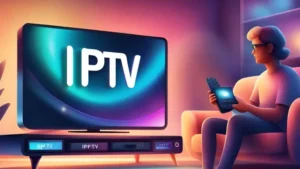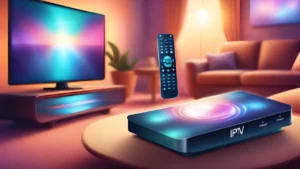Everyone wants their IPTV to run smoothly. But sometimes, you might face issues like buffering or channels not working. These can get in the way of your shows. However, knowing what goes wrong and how to fix it can make your watching experience better.
Key Takeaways
- Understand the most prevalent IPTV issues, including buffering, poor video quality, and channel inaccessibility.
- Learn how to diagnose IPTV problems by checking internet connectivity, updating software, and troubleshooting the IPTV app.
- Discover practical solutions to resolve IPTV service problems, such as rebooting devices, using a wired connection, and contacting the service provider.
- Implement best practices to prevent IPTV issues and maintain a seamless streaming experience, including ensuring a stable internet connection and using compatible devices.
- Utilize reliable tools and techniques for efficient IPTV troubleshooting, such as employing a VPN and optimizing router placement.
Understanding IPTV and Its Benefits
In today’s fast-changing digital TV world, IPTV is making a big difference. It uses the internet to send TV shows and more to people’s screens. This method is way more flexible and affordable than the old cable TV. With IPTV, you can watch what you want, when you want, on all your favorite devices.
What is IPTV?
IPTV stands for Internet Protocol Television. It sends TV programs and videos over the internet instead of using cables. Big companies like Verizon, Apple, and AT&T offer these services. There are also smaller providers that focus on special kinds of shows for different viewers.
Advantages of IPTV Over Traditional TV
- On-demand viewing: You can watch shows and movies whenever you like, not just when they’re broadcast.
- Compatibility with multiple devices: It works on smart TVs, computers, phones, and tablets, making it easy to watch.
- High-quality streaming: Many IPTV services offer super clear, high-definition videos for a better viewing experience.
- Customizable content: You get to pick from a variety of channels from all over the world, tailoring your viewing to your preferences.
- Commercial-free viewing: Often, there are no ads, so you can enjoy programs without interruptions.
Every year, more people are choosing IPTV, with its popularity growing at a rate of 30% to 35%. Today, over a billion people are using IPTV because it’s flexible, affordable, and offers a wide variety of content.

Most Common IPTV Issues
IPTV has changed how we watch TV, but it’s not perfect. Common issues include buffering, low-quality video, and channels not working.
Buffering and Freezing
IPTV issues like buffering and freezing happen a lot. These can come from a bad internet connection, problems on the service’s side, or your device’s settings. Making sure your internet is both fast and stable is key to enjoying IPTV without interruptions.
Poor Video Quality
Seeing poor video quality is another common IPTV issue. This can be anything from fuzzy pictures to black screens. Often, it’s because of slow internet or if your internet provider is limiting your connection. Checking your internet speed often and maybe upgrading your IPTV service can fix this.
Channel Unavailability
When channels don’t work, it’s a common IPTV issue that upsets people. It might happen because your playlists are not updated, there’s a network problem, or the IPTV provider itself is having issues. To avoid this, make sure you know about any service changes and keep your IPTV subscription active and reliable.
Fixing these IPTV issues often involves doing some tests, like checking your internet and restarting your devices. Sometimes, you might need to reach out to your IPTV provider for help. But by dealing with these challenges, watching IPTV can become smooth and problem-free.
IPTV Issues: Identifying and Diagnosing
Troubleshooting iptv issues is key to a smooth streaming experience. Problems can be as simple as buffering or as big as VPN errors. Mostly, these issues link back to your internet connection.
Making sure your internet is fast and stable can fix many iptv problems. To diagnose, check your internet speed, clear your device’s cache, review VPN setup, and watch your internet at different times. Finding the main issue helps fix it with the right tools. Then, your IPTV will work without trouble.
- Test internet speed: Make sure your internet is fast enough for IPTV, usually 30-40 Mbps for 4K.
- Clear device cache: This can help with buffering and freezing.
- Inspect VPN settings: Check your VPN to make sure it’s not the issue.
- Monitor internet performance: Watch for changes in speed, especially at busy times.
| Common IPTV Issues | Possible Causes | Troubleshooting Steps |
|---|---|---|
| Buffering and Freezing | Inadequate internet speed, network congestion, or device cache issues | Test speed, clear cache, and ensure a good internet connection |
| Poor Video Quality | Not enough internet, ISP slowing you down, or device issues | Check speed, look for ISP problems, and ensure your device works with IPTV |
| Channel Unavailability | Outdated playlist, subscription trouble, or provider issues | Update your playlist, check your subscription, and talk to your provider if needed |
Understanding iptv issues and using a logical troubleshooting method can help.
This lets users find and fix many IPTV problems, making streaming fun and easy.
Network Connectivity and IPTV Problems
Good IPTV streaming needs a strong internet connection. If your network is weak, you’ll see buffering and low quality. Start by checking your internet’s speed. It should match what your IPTV service recommends.
Checking Internet Speed
For IPTV to stream well, you need high-speed internet. Experts suggest at least 5Mbps for normal video, 10Mbps for HD, and so on. Statistic 1: A steady 30/40MB internet from your service provider is good enough for 4K UHD.
If your speed isn’t up to par, you’ll have trouble watching. Check speeds on different devices and places at home. This can find what’s slowing you down.
Resetting Router or Modem
Resetting your router or modem is a quick fix for network troubles. Statistic 2: Starting with a reboot of your router and IPTV device can solve many issues. This can clear up small problems and make your connection stable.
Try both Ethernet and Wi-Fi connections for your IPTV. Wi-Fi can have more problems. Statistic 3: Testing IPTV on both connections helps find and fix common issues.
If problems continue, it might be the app or network traffic. Check if your service is having issues when many people are watching.
IPTV Issues: Practical Solutions
Dealing with IPTV issues can get frustrating, but there are steps you can take. These steps can help you fix common problems. If you’re facing issues like bad streaming quality or channels not working, we’ll show you how to fix them.
Troubleshooting Poor Streaming Quality
Poor streaming quality, like buffering or audio issues, is a big problem. Begin by checking your internet connection. If it’s slow, try resetting your router. Or, if on Wi-Fi, get closer to it.
If the issue continues, call your IPTV service provider or Internet Service Provider (ISP) for help.
If many channels have the same issue, it’s likely the IPTV provider’s fault. Contact their support team for help. They can suggest ways to improve streaming.
Resolving Channel Not Working Issues
Sometimes, channels won’t work or aren’t available. This could be due to various reasons, such as lineup changes or network issues.
- Start by checking if the channel is still available via your IPTV subscription. If not, it might be gone for good.
- Make sure your internet is strong enough for the channel. If not, try moving closer to your router or reset it.
- If problems remain, tell your IPTV provider about the channel. They’ll look into it and help you fix it.
Follow these steps to tackle common IPTV issues. This way, you can enjoy your viewing without any hiccups.
Preventing IPTV Issues for Seamless Streaming
To love watching IPTV without problems, you should be ready. Keep your internet strong, use the right tools, and update your software often. This helps stop issues like long loading, screen freezing, or not finding your favorite channels.
Ensuring Stable Internet Connection
The start of a good IPTV experience is a fast, reliable internet. You need at least 5Mbps if you plan to watch in standard quality. For better quality like HD or 4K, you need faster speeds. Wired internet is better than Wi-Fi for watching IPTV because it stops problems from Wi-Fi interference.
Using Compatible Devices
Your IPTV works well if it matches the device you’re using. Make sure your smart TV, set-top box, or media player can work with your IPTV service. Always update the software on your device. This makes sure IPTV runs smoothly and doesn’t have trouble showing your favorite shows.
Keeping Software Updated
Always update your IPTV service software and device apps. Updates fix bugs, make things work better, and sometimes add cool new features. These updates help your IPTV service stay reliable. They also make sure you don’t face common problems.
To make your IPTV experience great, focus on three things. Have a strong internet, pick the right devices, and keep everything updated. This way, you’ll watch your shows without worry.
Best Practices and Tools for IPTV Troubleshooting
To tackle IPTV problems, you need the right tools and some know-how. Using a good Virtual Private Network (VPN) is a smart move. It stops your Internet Service Provider (ISP) from slowing down your video streams. With a VPN, you can avoid these slows and enjoy your shows without hiccups.
Using a Reliable VPN
For IPTV issues, a VPN is a must-have weapon. It protects your online data and avoids ISP slowdowns. Good VPN use means your TV will play smoothly, no matter what your ISP is doing. Always pick a VPN from a trusted company. They’ll offer fast and steady connections.
Optimal Router Placement
Where you put your router matters a lot for IPTV. It should sit in a central spot, free from things like microwaves. These things can mess up your signal. Make sure your router isn’t hidden behind furniture either. A well-placed router means better Wi-Fi and trouble-free TV streaming.
Combine a trusty VPN with good router settings to dodge IPTV problems. These tricks will make your IPTV watching smooth and reliable.
IPTV Issues
While IPTV technology has a lot of benefits, it sometimes faces issues. These IPTV issues include buffering, freezing, and low-quality videos. They can make watching TV a frustrating experience. But, knowing why these issues happen and how to fix them can make your IPTV time smooth and enjoyable.
Buffering and Freezing
Buffering and freezing are common issues with IPTV. They happen because of bad internet, faulty devices, or too many people using the network. To fix this, make sure your internet is fast enough. You need at least 5Mbps for regular quality, 10Mbps for 720p HD, and so on.
How to Setup IPTV Subscription on Firestick in 2024
Poor Video Quality
Another big problem is poor video quality. It’s usually due to not enough bandwidth, a busy network, or problems at the IPTV provider’s servers. To solve this, check your internet’s speed and make sure your connection is strong. You might also try connecting your device straight to the modem to avoid router issues.
Channel Unavailability
Sometimes, IPTV users can’t find the channels they want. This might be because of buggy software, full data caches, or connection problems. Try restarting your device or clearing the cache to see if that helps. If it doesn’t, get in touch with your IPTV provider for more help.
| Issue | Probable Cause | Recommended Solution |
|---|---|---|
| Buffering and Freezing | Slow or unstable internet connection, faulty hardware or software | Ensure minimum internet speed of 5Mbps for standard, 10Mbps for 720p HD, 20Mbps for 1080p HD, and 30Mbps for 4K content |
| Poor Video Quality | Bandwidth limitations, network congestion, issues with IPTV provider’s servers | Check internet speed and connect IPTV device directly to the modem |
| Channel Unavailability | Software glitches, data and cache accumulation, connection problems | Reboot IPTV device, clear cache, and contact IPTV provider if issue persists |
Being aware of common IPTV issues and how to troubleshoot them is key for IPTV subscribers to have a great experience. Keeping your network in good shape and being proactive about solving problems can go a long way. This ensures your IPTV service is reliable and enjoyable.
Conclusion
IPTV technology has many benefits over traditional TV. Yet, it faces some technical hurdles. By knowing and tackling common IPTV issues, you can make your viewing experience better. Make sure your internet is stable, devices are compatible, and your software is up to date to avoid problems.
With the right know-how, you could truly leverage IPTV’s benefits. This way, your home entertainment can get a huge boost. If you need a dependable IPTV subscription, look at what Streamtvuniverse offers in the USA. They are a top IPTV provider. By dealing with key IPTV issues and following best practices, you can make the most of this cool tech. This will give you an amazing, hassle-free, and immersive experience.
The IPTV market is growing fast, at a rate of about 15.1% each year from 2023 to 2032. It serves many user needs and comes in various forms like Live TV, VOD, and Time-Shifted TV. This makes it more and more popular for viewing content and TV over the internet. By keeping yourself up-to-date and ready to solve IPTV issues, you can fully enjoy the perks of this modern technology. It promises to offer a smooth, cheap, and tailored entertainment experience.
FAQ
What are the most common IPTV issues?
Buffering and freezing, poor video quality, and channel unavailability are common IPTV problems.
How can I troubleshoot IPTV issues?
If you have IPTV issues, start by checking your internet. Update your device’s software. Then, look at the IPTV app and your equipment. Monitoring for outages and contacting support is also smart.
What are the advantages of IPTV over traditional TV?
IPTV is great for its flexibility, savings, and broad content library. You can watch shows on-demand and on various devices.
How can I ensure a stable internet connection for IPTV?
To keep your internet stable for IPTV, check your speed and reset your router. If these don’t help, contact your ISP for more support.
How can I prevent common IPTV issues?
For a smoother IPTV experience, always keep your internet connection strong. Use devices that work well and update your IPTV software regularly.
What tools can I use for IPTV troubleshooting?
A good Virtual Private Network (VPN) is a top tool for IPTV troubleshooting. It can stop ISP throttling and make streaming smoother.
Source Links
- How to Troubleshoot Common IPTV Problems
- IPTV Troubleshooting: Common Problems and Solutions – aerostreams
- IPTV Troubleshooting
- What is IPTV (Internet Protocol television) and how does it work?
- Understanding IPTV- What is IPTV and How Does It Work?
- What is IPTV? The Best IPTV Guide and Benefits of IPTV
- How Can I Fix and Troubleshoot the Most Common IPTV Issues in 2023?
- Troubleshooting Common IPTV Not Working Issues And Solutions | The Best IPTV Subscription Service Provider 2023
- Common IPTV Problems and Their Solutions | luckintv
- IPTV Troubleshooting
- IPTV Troubleshooting: Common Problems and Solutions – aerostreams
- How to Troubleshoot Common IPTV Problems
- IPTV problems & internet connection help guides
- How to Fix IPTV Buffering and Freezing Issues (2024)
- Troubleshooting IPTV: A Guide to Resolving Common Issues for Seamless Viewing
- What is IPTV? How To Solve IPTV Buffering or Freezing?
- [SOLVED] IPTV, IGMPProxy and Firewall issues
- Is Your ISP Blocking IPTV? Here’s a List of ISPs Blocking IPTV and How to Fix!
- Troubleshooting Your IPTV Connection: Tips and Support for Uninterrupted Streaming
- Trouble with IPTV provider with frequently changing URLs
- Test and Measurement White Paper for IPTVe
- Mariner Improves IPTV QoE With Microsoft Mediaroom Client 2.2 Integration
- What Is IPTV: How It Works, Types, Pros, & More
- Troubleshooting Common IPTV Issues
- IPTV: A Comprehensive Guide to Internet Protocol Television






